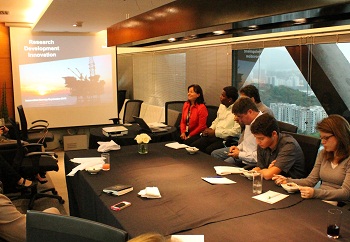As of January 2013, the research division of Statoil in Brazil, called Research Center Rio, is managed locally from Rio, and no longer from Norway. Ms. Marianne Høie, the head of the division, was relocated to Rio de Janeiro in order to increase the local presence.
On September 24, Ms. Høie made a presentation about Statoil’s R&D activities and plans in Brazil during the Lunch&Learn event, a monthly luncheon hosted by Innovation Norway in the Rio Sul business tower.
The primary objective of the Research Center Rio is to fulfill the 1 percent obligation of the ANP, meaning that the companies in the oil and gas industry have to invest 1 percent of their revenues from oil production in research in Brazil.
In 2012, Statoil invested 20 million BRA in R&D projects and in 2013, the company intends to invest 32 million BRA.
The Brazilian research division of Statoil also aims to support the company’s research activities worldwide, and research conducted in Brazil will come to good use in countries like Angola and in the Gulf of Mexico in the future.
“Our focus areas are carbonate reservoirs, increased recovery, subsea technology and the developing of a full-scale subsea factory, CO2 management and special projects and industrial development”, Ms. Høye explained.
Exchange programs
The “Science without border” program was also one of the the topics she talked about, and in a recent press release, Statoil informs that the company has joined the Brazilian “Science Without Borders” program.
The program was introduced by the Ministry of Science, Technology and Innovation (MCTI) and the Ministry of Education (MEC), and the goal is to promote the internationalization of science and technology, innovation and Brazilian competitiveness through an international exchange program.
The agreement was signed August 8, and will be implemented in two phases. The first phase will have an investment of USD 3 million to fund approximately 62 scholarships for a Full Doctorate Abroad (“GDE”), a Sandwich Doctorate Abroad (“SWE”), Post-Doctorate Studies Abroad (“PDE”) and Technology Development Abroad (“DTE”) related to oil and gas.
Phase two will have investments totaling USD 12 million over four years for co-financing of scholarships offered to Brazilian students taking part in the Science without Borders Program in in R & D projects in foreign educational institutions, as well as visiting professors from foreign institutions who are interested in developing R & D projects in Brazilian universities as Special Visiting Researchers (“PVE”).
The number of scholarships and distribution for each one may vary slightly due to demand and the chosen country.
The president of Statoil Brazil, Thore E. Kristiansen, highlights the importance of being a partner in a program like Science without Borders, putting together science and technology to benefit the people and the nation, one of the cornerstones of the Norwegian company.
“The scientific research and development should promote knowledge and aim for results that benefit society, generating competitiveness. We believe that investment in technology through study programs, training internships in leading companies and partnerships between institutions is one of the key factors in making it happen”, he says in a press release.
For the president of the CNPq research center, Glaucius Oliva, partnering with companies is not only successful in terms of investments, but also in the exchange of experiences and knowledge practices in pursuit of more consolidated international cooperation.
“The CsF program is not only about giving grants. Their role is to enhance professional skills, explore successful practices collaboratively with the industry through internship programs and even fixed employment opportunities in the areas of cutting edge science and technology. We want foreign researchers to return periodically to our country and that our own researchers take with them and bring back the knowledge gained.”
Since July this year, Statoil has also been a partner in the Jobs & Internships Portal. The portal aims to facilitate easy access for grant students and alumni of the Science Without Borders program and business partners to job opportunities and companies looking for highly qualified professionals.
Seismic interpretation
In Brazil, Statoils supports a separate post-graduate course at the federal university of Rio, UFRJ, called Seismic interpretation. The objective is to promote the qualification of professionals in geosciences and seismic interpretation.
Statoil currently has research facilities in Canada, USA, Brasil, China and Norway and uses around 3 billion NOK a year on research.
Source: Statoil / Runa Hestmann Tierno
Photo courtesy of FMC Kongsberg/Statoil and RHT
:


